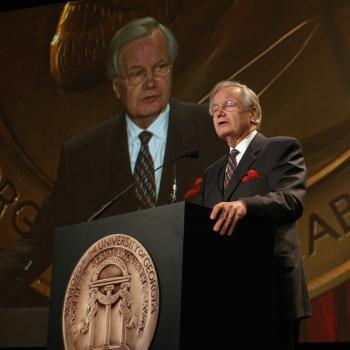
… or do they? Go below the surface, and you may find some surprises.
Religion is important to billions of people across the globe – so much so that humankind’s differences over religion have caused one conflict after another since ancient times.
But what about the similarities? Is there any common ground upon which the major religions can find more peaceful solutions to their disagreements.
Read the headlines and you might think not.
It’s been Christian against Jew. Jew against Muslim. Muslim against Christian. Hindu against Christian. Sikh against Muslim. Hindu against Buddhist. Buddhist against Muslim. Muslim against Hindu. Sikh against Christian. It’s also been Christian against Christian, Muslim against Muslim and so on.
The causes? Deeply held religious beliefs combined with fear, oppression and disputes over territory, power, money and resources, ethnic and cultural differences and other issues.
Add peoples’ desire to feel superior to others, and you find yourself standing on a fertile ground for violence.
There must be a better way.
Two Major Religion Groups
Worldwide, there are more than 4,000 religions that consist of countless denominations and groups within groups. The dynamics are quite complex.
The two largest religion groups are Abrahamic (Christianity, Judaism and Islam) and Eastern or Indian (Hinduism, Buddhism and Sikhism), according to Britannica. Learn more here.
In today’s post, we will look at the Abrahamic religions. Next time, the focus will be the Eastern religions and any similarities they may share with Abrahamic religions.
The Abrahamic Religions
The Abrahamic religions trace their roots to a man named Abraham, whose story appears in the Christian and Hebrew Bibles and the Muslim Quran or Koran.
I have researched Jewish and Muslim beliefs with great care and have taken great pains to verify the information about them as well as my own religion – Christianity.
Please let me know if I have missed anything important or have made any errors regarding your faith by clicking here.
CHRISTIANITY:
Let’s begin with Christianity, which has guided my life since early childhood and has led my family for generations. For us Christianity is more than once-a-week services and occasional communion. It is the foundation of our lives.
The Apostle’s Creed
The Apostle’s Creed is an excellent statement about the Christian faith. Written around the 5th century, it describes Christian beliefs in this way.
I believe in God the Father, Almighty, Maker of heaven and earth,
And in Jesus Christ, His only Son, our Lord;
Who was conceived by the Holy Spirit,
Born of the virgin Mary,
Suffered under Pontius Pilate,
Was crucified, dead and buried:
(He descended into hell.*)
On the third day He arose from the dead
And sitteth at the right hand of God the Father, Almighty;
From thence He shall come to judge the quick** and the dead.
I believe in the Holy Spirit,
The holy catholic*** church;
The communion of saints;
The forgiveness of sins;
The resurrection of the body;
And life everlasting. Amen.
(*This statement appears in some, but not all, versions of the Apostles’ Creed. It refers to the belief that Christ ascended into hell before his resurrection in order to liberate spirits imprisoned there. **The “quick” means the “living.” *** “Catholic” with a small “c” refers to the universal Christian church.)
The Creed’s Meaning
The Apostle’s Creed states that Christians believe in the one true God that is all-powerful, eternal, ever-present, all-knowing, all-mighty and holy. It also states that Christians believe in the divinity of his son, Jesus, and in the Holy Spirit, which is God’s divine presence in our world.
We believe that Christ was conceived by the Holy Spirit and born to a virgin named Mary. The Holy Spirit is one part of the Trinity, which consists of God the Father, God the Son and God the Holy Spirit.
The concept of the Trinity often confuses non-Christians. Let me make it clear that Christians do not believe in multiple gods. There is one God who takes the form of father, son and spirit.
In simple terms, religious experts have compared the concept of the Trinity to an apple. The apple has skin, fleshy meat and seeds. Each part is separate, but it’s still an apple. A better comparison for me, at least, is water. We have water in liquid form, but we can freeze it to form ice or boil it until it steams. It takes different forms but is still water.
For a non-denominational explanation of the Trinity, click here. See the Catholic explanation by clicking here..
Christ was crucified and died but arose from the dead and ascended into heaven.
The Apostle’s Creed ends with a list of major Christian beliefs. But what does “communion of saints” mean?
One meaning is that “it refers to the whole community of faithful followers of Christ, living and dead, past, present and future,” according to the United Methodist Church. “We believe that the church is the communion of saints, and as a believer, you belong to the communion of saints,” says Rev. Katie Shockley, minister in the United Methodist Church.
“Saints” in this context certainly doesn’t mean that all of us are saints!
The Christian Bible
The Christian Bible consists of the Old Testament, which corresponds to the Hebrew Bible that Jews use, and the New Testament, which shares Christ’s teachings. Protestant Bibles don’t go beyond the Old and New Testaments.
The Catholic Bible, however, contains an additional section between the Old and New Testaments called the Apocrypha. Catholics believe these books are worthy of study but are not inspired by God. Learn more here.
Latter-day Saints study the Holy Bible as well as the Book of Mormon, which they consider a divinely inspired work that God shared with their founder, Joseph Smith. Read more here.
JUDAISM
Judaism can be considered the father of Christianity and Islam. It began about 4,000 years ago in the Middle East and traces its roots to Abraham and ultimately to Adam.
One point of agreement for all three religions is that the Jews made a covenant with God in which Abraham agreed to keep the faith with God and God agreed to bless Abraham and his descendants. Abraham obeyed God, and God showered him and his family with blessings through his son Isaac (Judaism and Christianity) and Ismael (Islam).
A Complex Faith
Judaism is a complex faith that incorporates theology, law and numerous cultural traditions, according to Britannica. Read more here.
Jews believe that “their response to the divine presence in history was central not only for themselves but for all humankind,” Britannica says.
“Furthermore, God – as person – had revealed in a particular encounter the pattern and structure of communal and individual life to this people.”
Similar Beliefs
As mentioned earlier, Jews and Christians use the Hebrew Bible, which Christians call the Old Testament. The two religions consider the text to be sacred, worship the same God and revere many of the same historical people including Abraham, Isaac, Moses and King David. Read more here.
Both religions read the words of prophets such as Isaiah, Jeremiah and Ezekiel, and accept the Ten Commandments as divinely inspired principles that God revealed to Moses.
“The Ten Statements are often cited as the epitome of what has become known as ‘Judeo-Christian Civilization,’” says The Jerusalem Post. The Post then questions the universality of that statement. That’s a topic for another post, but if you would like to read more, click here.
Where Judaism and Christianity Diverge
The two religions’ views about Jesus are the greatest differences between Judaism and Christianity. Jews do not accept the New Testament, nor do they believe that Jesus is a prophet, the messiah or the son of God.
“The exact way Jews have spoken about Jesus has, throughout history, had a lot to do with the social and political contexts where they were living,” according to My Jewish Learning, a leading trans-denominational website that provides information about Judaism. Click here for more information.
“Jews have often been subjects of Christian monarchies and governments, and the tenor of their experience often colored the way particular communities responded for the church as a whole and Jesus in particular,” the website says. “Today, as Jews and Christians live in relative harmony, the attitude among most Jews toward Jesus is one of respect, but not religious reverence.”
Dr. Amy-Jill Levine, a professor of New Testament studies at Vanderbilt University Divinity School, points out, “Just as there is no single Jewish view on most matters, there is no single Jewish view about Jesus of Nazareth: some Jews regard him as a wise rabbi, others view him as a heretic; some find inspiration in his teachings, others take offense at his claims.”
She adds that a lot of Jews don’t know much about Christ or the New Testament.
The post on www.myjewishlearning.com concludes by saying that much interfaith work emphasizes common beliefs. “There are many things that the world’s major faiths do share. But where Jews draw the line is calling Jesus a prophet or messiah.” Read more here.
ISLAM
The second largest religion in the world after Christianity is Islam. Like Christianity and Judaism, Islam originated in the Middle East with Abraham.
The three faith traditions are similar in several ways, according to the United Religions Initiative (URI), a global interfaith network. To learn more, click here.
- Muslims believe in one God called Allah.
- They believe that every person is a child of Allah.
- They believe that Allah is the all-powerful, all-knowing and ever-present Creator.
- Their holy book, the Quran or Koran, teaches moral, ethical and spiritual values.
- Muslims revere several biblical figures as prophets including Abraham, Jacob and Moses.
- Muslims believe there will be a judgment day.
- They believe in life after death.
- They believe in angels.
- They believe that Satan is a real entity who tries to tempt people away from Allah.
- Like Christians, Muslims believe that Jesus was born to the virgin Mary.
- And like many Christians and Jews, they believe in purification by fasting.
The Qur’an has a number of rules that are familiar to Christians and Jews, according to the URI:
- Do not lie.
- Do not steal.
- Do not be rude to your parents.
- Respond to evil with good.
- Forgive others as you would like Allah to forgive you.
Diverging Beliefs
While Christianity, Judaism and Islam share several basic beliefs, they often diverge in major areas.
- Followers of all three religions believe in one God, but they disagree about the nature of God.
- Christians believe in the Trinity in which there is one God who takes the form of God the Father, God the Son and God the Holy Spirit. Muslims see Christ as a human prophet, but neither they nor Jews accept the Holy Trinity.
- Each religion has sacred scripture, but the scriptures have crucial differences. Jews follow the teachings of the Hebrew Bible. The Christian Bible contains the Hebrew Bible (or Old Testament) and also has the New Testament containing Christ’s message to the world. Muslims follow teachings of the Quran, which Allah revealed to Muhammed according to Islamic belief. Neither Christians nor Jews accept the Quran.
The British Library’s website features an excellent article, “The Abrahamic Religions,” by Dr. Anna Sapir Abulafia, who is a professor at Oxford. Read it here.
Next Time:
My next post will look at the three major Eastern religions: Hinduism, Buddhism and Sikhism. What do their followers believe, how are they similar to one another and do they have anything in common with the Abrahamic religions?













